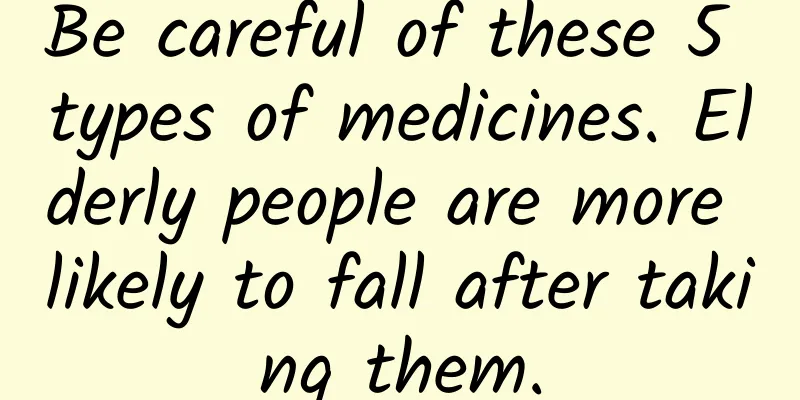Be careful of these 5 types of medicines. Elderly people are more likely to fall after taking them.

|
Author: Shen Zhujun, Chief Physician, Peking Union Medical College Hospital, Chinese Academy of Medical Sciences Reviewer: Guo Shubin, Chief Physician, Beijing Chaoyang Hospital, Capital Medical University Falls are a common accidental injury among the elderly. According to the World Health Organization, about 646,000 people worldwide become disabled due to falls each year, of which the elderly account for a large proportion. When an elderly person accidentally falls, they may suffer from bruises and hematomas at the very least, or even hip fractures and become bedridden in severe cases. In addition to aging and decreased sense of balance, falls are also caused by taking certain medications. Today we will look at the medicines that are likely to cause falls in the elderly, and how we should pay attention to reducing falls caused by taking medicines. Figure 1 Copyright image, no permission to reprint 1. Taking these 5 types of medicines can make the elderly prone to falling 1. Sedative hypnotic Many elderly people take sedatives and hypnotics such as estazolam, zolpidem, and zopiclone due to sleep disorders. These drugs can affect the elderly's postural stability and sense of balance, increasing the risk of falling when getting up at night. 2. Antidepressants Some older people who suffer from depression take antidepressants, such as monoamine oxidase inhibitors and tricyclic antidepressants, which can cause blurred vision, drowsiness, rapid heartbeat, difficulty urinating, and orthostatic hypotension, which can increase the risk of falls. 3. Anti-epileptic drugs When taking anti-epileptic drugs, as the dosage increases, some elderly people will experience symptoms such as dizziness, headache, unsteady walking, and lack of concentration, which increases the risk of falling. 4. Antihypertensive drugs Most elderly people have high blood pressure and need to take antihypertensive drugs on a daily basis. However, taking certain antihypertensive drugs can cause orthostatic hypotension, especially when getting up or changing body positions, which can easily cause the elderly to stand unsteadily and increase their risk of falling. 5. Diabetes-lowering drugs Some elderly people with diabetes need to take hypoglycemic drugs to control blood sugar in addition to paying attention to their daily diet. However, hypoglycemic drugs can cause adverse reactions such as hypoglycemia, which may cause the elderly to have a strong sense of hunger, cold sweats, palpitations, general weakness, trembling hands and feet, dizziness, etc., which may cause the elderly to fall. Figure 2 Copyright image, no permission to reprint 2. Reasons why elderly people are prone to falling when taking medicine For the elderly, their body functions decline with age, and their legs and feet are not as flexible as when they were young. If they exercise or walk right after taking medicine, they will fall easily. For example, after taking sedatives, hypnotics and other drugs that act on the central nervous system, the drug effects usually take effect within half an hour. These drugs will affect the body's ability to balance. If the elderly stand up and walk or get up from bed at this time, they may fall. In addition, due to the degeneration of the body's tissues and systems in the elderly, especially the decline in the excretion function of the kidneys and the detoxification function of the liver, when taking more medications, they are prone to falls due to adverse drug reactions. For example, when taking high doses of drugs that act on the central nervous system, the elderly's body metabolism and excretion functions are weakened, and they metabolize the drugs poorly, which makes them more likely to have adverse drug reactions and lead to falls. 3. Pay attention to 3 key points to prevent falls caused by taking medicine Not taking medicine will affect your health, but taking medicine may lead to falls and injuries. So, what can we do to reduce the risk of falls? Avoid improper use of medication First of all, the elderly need to have clear symptoms before they can take medication according to the doctor's advice. For example, some elderly people have poor sleep quality, but the symptoms are not obvious, so they want to take sleeping pills on their own. This is not recommended. They should first remove the inducements from aspects such as life, diet, and daily life, so as to improve sleep. Secondly, if you need to take medication, especially medication that can easily cause falls, you should observe carefully when you first start taking it. If you feel any discomfort, write it down and seek medical attention promptly, and adjust the medication and dosage according to the doctor's orders. Avoid repeated use of the same medication Before adding a certain medication, you should tell your doctor what medications you are currently taking to avoid duplicate medications, which may lead to excessive doses, adverse drug reactions, and falls. For example, some elderly people take multiple antihypertensive or hypoglycemic drugs at the same time, which will increase adverse drug reactions and affect their health. Follow the precautions when taking medication Before taking the medicine, you should clearly understand the dosage, time of taking the medicine, method of taking the medicine and the adverse reactions of the medicine under the professional guidance of medical staff. If you miss a dose or take it by mistake, consult a doctor and do not blindly increase the dosage or stop taking the medicine. In addition, some elderly people like to take medicines with tea, rice soup, drinks, milk, etc., which may affect the effectiveness of the medicines. Finally, please note that you should not exercise immediately after taking the medicine, especially when you need to get up or go to the toilet after taking the medicine. You need to be more careful and it is best to have the support of your family to avoid falling. Figure 3 Copyright image is not authorized for reproduction As people age, their risk of falling increases, so they should try to reduce the risk of falling caused by taking medications. For the elderly, it is important to take medicine correctly and scientifically. Only by taking active precautions can we avoid the trauma caused by falls to the elderly. |
>>: I have had back pain since giving birth, and I dare not sit or lie down. This is because...
Recommend
Although the "Subject 3" is high, the hidden risks are also not small
This is the 4688th article of Da Yi Xiao Hu Recen...
What should I do if I feel dizzy, nauseous, or my period is delayed?
Menstrual problems are a chronic disease that aff...
Pregnant women's legs swollen picture
Generally, if pregnant women experience swollen f...
Why do I sweat a lot during late pregnancy?
During a woman's pregnancy, different precaut...
Is menstruation a way for women to detoxify?
Menstruation is a normal physiological period for...
Is my stomach bloating and pain due to pregnancy?
Pregnancy is a very important thing for modern pe...
Why do pregnant women have headaches and sore feet?
We all know that pregnant women will experience s...
31. Can I have a foot massage during my period?
As an important item of daily health care, foot m...
Can washing your face with milk remove freckles? What methods should be used to remove spots?
Nowadays, people often hear about washing your fa...
Can Daknin be used during breastfeeding?
Jindakening is a common medicine among us, and it...
Does a girl who takes the initiative appear to be casual? What kind of woman is casual in the eyes of men?
Are girls who take the initiative in love conside...
Do 60-year-old women have leucorrhea?
Every woman will have leucorrhea. After puberty i...
3 months pregnant belly picture
During the first three months of pregnancy, some ...
What are the benefits of millet porridge? Does millet porridge nourish the stomach?
Millet porridge is a healthy food in life. It can...
Can I drink saffron if I have less menstruation?
When women often find their menstrual period is a...









